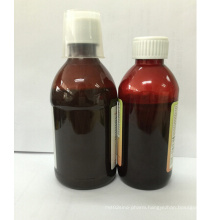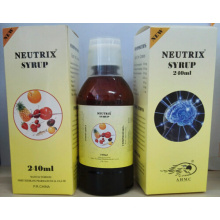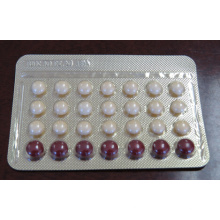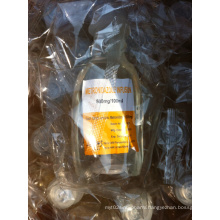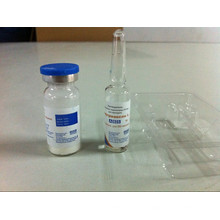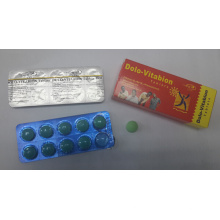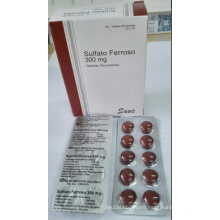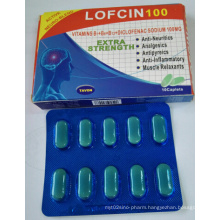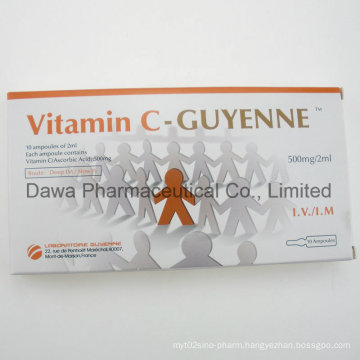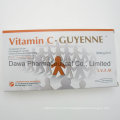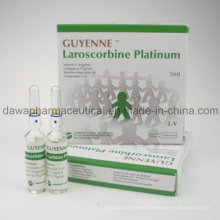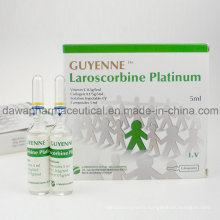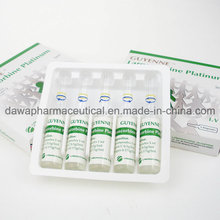Essential Beauty Whitening Nutreint Cosmeticologyvitamin C Injection 500mg/5ml, 500mg/2ml
Basic Info
Model No.: OV160518-08
Product Description
Model NO.: OV160518-08 Usage Mode: For external use State: Solid Type: Organic Chemicals Name: Vitamin C Injection Specifications: 500mg/2ml MOQ: 1 Box Quality Standard: GMP/Who GMP/Euro GMP Delivery Time: 7 Days Trademark: guyenne Origin: France Application: Internal Medicine Suitable for: Adult Shape: Oral Liquid Pharmaceutical Technology: Chemical Synthesis Brand&Origin: Guyenne, France Packing: 5AMPS/Tray/Box Sample: Acceptable Port: Guangzhou Shelf Life: 36 Months Specification: GMP/WHO GMP/EURO GMP HS Code: 2934100090 Essential Beauty
Whitening Nutreint Cosmeticology
Vitamin C Injection
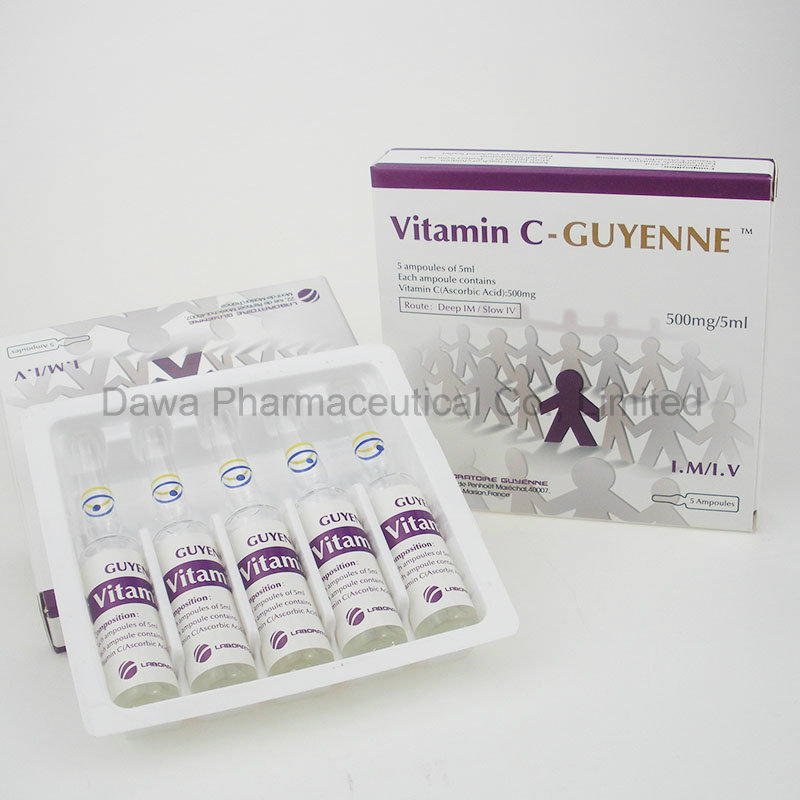
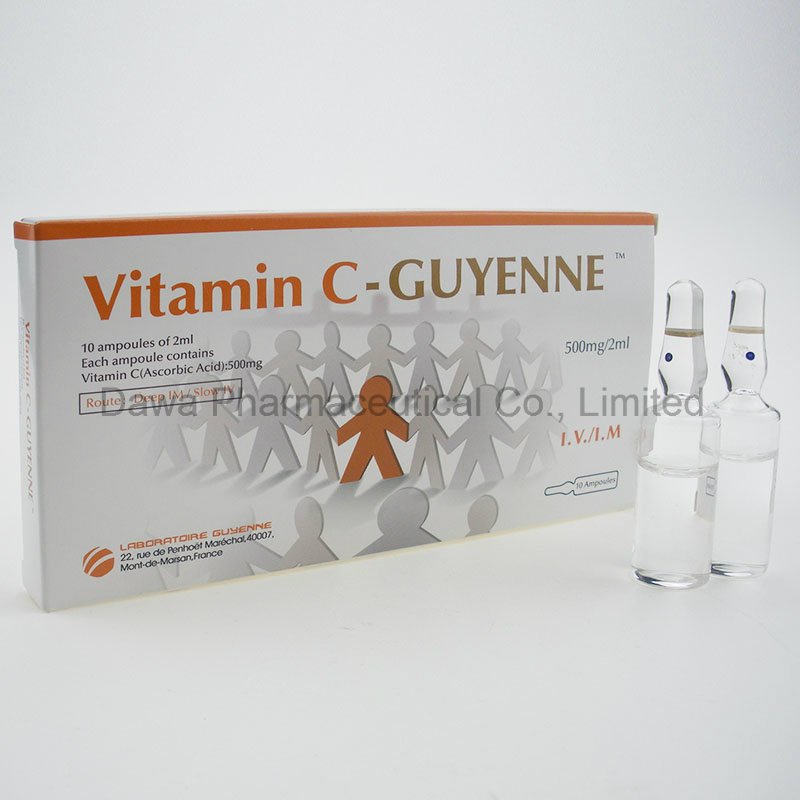
Pharmacology
Ascorbic acid, a water-soluble vitamin, is essential for formation of collagen and intercellular material,
and therefore necessary for the development of cartilage, bone, teeth and for
the healing of wounds. It is also essential for the conversion from folic acid to
folinic acid, facilitates iron absorption from the gastro-intestinal tract and influences haemoglobin formation and erythrocyte maturation.
Indications
The prevention and treatment of scurvy, or other conditions requiring vitamin C
supplementation, where the deficiency is acute or oral administration is difficult.
Dosage
Route of Administration: Parenteral
Adults
0.5 to 1g daily for scurvy, 200 to 500mg daily for preventative therapy.
Children
100 to 300mg daily for curative purposes, or 30mg daily for protective treatment.
Elderly
No special dosage requirements have been suggested.
Contraindications
Hyperoxaluria
Special Precautions
Ascorbic acid should be given with care to patients with underlying renal
due to the risk of formation of renal oxalate calculi. Tolerance may be induced
in patients taking high doses.
Large doses of Ascorbic Acid have resulted in haemolysis in patients with
glucose -6-phosphate dehydrogenase(G6PD)deficiency.
Undesirable effects
Large doses may cause gastrointestinal disorders including diarrhoea. Large
doses may also result in hyperoxaluria and renal oxalate calculi may form if the
urine becomes acidic. Doses of 600mg or more daily have a diuretic action.
Induced tolerance with prolonged use of large doses can result in symptoms of
deficiency when intake is reduced to normal.
Drug Interactions
Drugs which induce tissue desaturation of ascorbic acid include aspirin,
from cigarettes, alcohol, several appetite suppressants, iron phenytoin, some
anti-convulsant drugs, the oestrogen component of oral contraceptives and
Large doses of ascorbic acid may cause the urine to become acidic
Causing unexpected renal tubular reabsorption of acidic drugs, thus producing an exaggerated response. Conversely basic drugs may exhibit decreased reabsorption resulting in a decreased therapeutic effect. Large doses may reduce the response to oral anticoagulants.
It has been reported that concurrent administration of ascorbic acid and
fluphenazine has resulted in decreased fluphenazine plasma concentrations.
Ascorbic acid is a strong reducing agent and interferes with numerous laboratory
tests based on oxidation-reduction reactions. Specialised references should be consulted for specific
information on laboratory test interferences caused by ascorbic acid.
Ascorbic acid given in addition to desferrioxamine in patients with iron overload
to achieve better iron excretion may worsen iron toxicity, particularly to the heart,
early on in the treatment when there is excessive tissue iron. Therefore
it is recommended that in patients with normal cardiac function ascorbic acid
should not be given for the first month after starting desferrioxamine.
Ascorbic acid should not be given in conjunction with desferrioxamine in patients
with cardiac dysfunction.
Aspirin can reduce the absorption of ascorbic acid by approximately a third and
decreases urinary excretion by about half. The clinical importance of this is
uncertain.
Patients with kidney failure given aluminium antacids and oral citrate can develop
a potentially fatal encephalopathy due to marked rise in blood aluminium levels.
There is evidence that vitamin C may interact similarly.
Oral contraceptives lower serum levels of ascorbic acid.
Storage and shelf life
Do not store above 25ºC
Shelf life: 3 years. Contact us if you need more details on Vitamin. We are ready to answer your questions on packaging, logistics, certification or any other aspects about Vitamin C、Whitening. If these products fail to match your need, please contact us and we would like to provide relevant information.
Whitening Nutreint Cosmeticology
Vitamin C Injection
| Name | Specification | Package |
| Vitamin C Injection | 500mg/2ml | 5amps/tray/box |
| Vitamin C Injection | 500mg/5ml | 5amps/tray/box |


Pharmacology
Ascorbic acid, a water-soluble vitamin, is essential for formation of collagen and intercellular material,
and therefore necessary for the development of cartilage, bone, teeth and for
the healing of wounds. It is also essential for the conversion from folic acid to
folinic acid, facilitates iron absorption from the gastro-intestinal tract and influences haemoglobin formation and erythrocyte maturation.
Indications
The prevention and treatment of scurvy, or other conditions requiring vitamin C
supplementation, where the deficiency is acute or oral administration is difficult.
Dosage
Route of Administration: Parenteral
Adults
0.5 to 1g daily for scurvy, 200 to 500mg daily for preventative therapy.
Children
100 to 300mg daily for curative purposes, or 30mg daily for protective treatment.
Elderly
No special dosage requirements have been suggested.
Contraindications
Hyperoxaluria
Special Precautions
Ascorbic acid should be given with care to patients with underlying renal
due to the risk of formation of renal oxalate calculi. Tolerance may be induced
in patients taking high doses.
Large doses of Ascorbic Acid have resulted in haemolysis in patients with
glucose -6-phosphate dehydrogenase(G6PD)deficiency.
Undesirable effects
Large doses may cause gastrointestinal disorders including diarrhoea. Large
doses may also result in hyperoxaluria and renal oxalate calculi may form if the
urine becomes acidic. Doses of 600mg or more daily have a diuretic action.
Induced tolerance with prolonged use of large doses can result in symptoms of
deficiency when intake is reduced to normal.
Drug Interactions
Drugs which induce tissue desaturation of ascorbic acid include aspirin,
from cigarettes, alcohol, several appetite suppressants, iron phenytoin, some
anti-convulsant drugs, the oestrogen component of oral contraceptives and
Large doses of ascorbic acid may cause the urine to become acidic
Causing unexpected renal tubular reabsorption of acidic drugs, thus producing an exaggerated response. Conversely basic drugs may exhibit decreased reabsorption resulting in a decreased therapeutic effect. Large doses may reduce the response to oral anticoagulants.
It has been reported that concurrent administration of ascorbic acid and
fluphenazine has resulted in decreased fluphenazine plasma concentrations.
Ascorbic acid is a strong reducing agent and interferes with numerous laboratory
tests based on oxidation-reduction reactions. Specialised references should be consulted for specific
information on laboratory test interferences caused by ascorbic acid.
Ascorbic acid given in addition to desferrioxamine in patients with iron overload
to achieve better iron excretion may worsen iron toxicity, particularly to the heart,
early on in the treatment when there is excessive tissue iron. Therefore
it is recommended that in patients with normal cardiac function ascorbic acid
should not be given for the first month after starting desferrioxamine.
Ascorbic acid should not be given in conjunction with desferrioxamine in patients
with cardiac dysfunction.
Aspirin can reduce the absorption of ascorbic acid by approximately a third and
decreases urinary excretion by about half. The clinical importance of this is
uncertain.
Patients with kidney failure given aluminium antacids and oral citrate can develop
a potentially fatal encephalopathy due to marked rise in blood aluminium levels.
There is evidence that vitamin C may interact similarly.
Oral contraceptives lower serum levels of ascorbic acid.
Storage and shelf life
Do not store above 25ºC
Shelf life: 3 years. Contact us if you need more details on Vitamin. We are ready to answer your questions on packaging, logistics, certification or any other aspects about Vitamin C、Whitening. If these products fail to match your need, please contact us and we would like to provide relevant information.
Product Categories : Anti-Age Products
Other Products
Hot Products
High Quality 200mg Amiodarone Hydrochloride TabletsLarge Stock Whiten Skin Monobenzone CreamGeneral Medicine Omeprazole 20mg Injection for Gastrohelcosis and Stomach AcidGeneral Medicine Ceftriaxone Sodium InjectionReady Stock Skin Whitening Anti-Aging Vitamin C InjectionOEM Tablet 500mg ParacetamolHigh Quality 500mg Hard Capsules Amoxicillin (amoxycillin)Best and Low Price Ceftriaxone Sodium Injection CeftriaxoneBest Quality Omega 3 Deep Sea Softgel Capsule Fish OilFDA Approved Curative Antimalarial ArtemisininMedicine Treating Brain Injury Citicoline Sodium InjectionProtease Alpha Chymolase for Inflammatory EdemaGeneral Medicine Medroxyprogesterone Acetate InjectionAmikacin Injection General Medicine DrugsSkin Whitening Gsh Personal Care Glutathione InjectionBody Slimming Fitness Lose Weight Weight Loss L-Carnitine Injection2.0g/5ml
